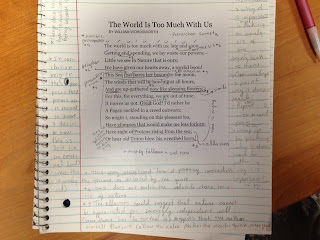So I found a couple of elements and decided to see what function they had on the piece:
- Form: This poem is best classified as a petrarchan sonnet, due to the 14 line set up and the shift occurring in line 9. Now what arises from this form? Well, it certainly makes the poem feel rigid when compared to more lyrical forms. I felt like in a sense this even contradicted the message of the poem, which encourages tuning into the free floating nature that surrounds us.
- Meter: This poem, for the most part, follows iambic pentameter. Again, I would argue that this element of the poem does not support the theme because, similar to its rigid form, this meter seems to constrain the poem. In turn, this contrasts with the theme of nature, which is typically known as being unpredictable.
- Personification: This device stuck out to me from the lines "This Sea that bares her bosom to the moon" and "The winds that will be howling at all hours." Through personification, I believe the speaker raises awareness to the equality between nature and humans, perhaps suggesting that therefore, humans should be more appreciative of nature.
- Allusions: I identified these in the last two lines of the poem, where the speaker remarks lamenting that he does not worship pagan Grecian gods. I feel like this allusion, though, undervalues the volatile characteristic of nature, and it almost seems that the speaker himself is not attracted to nature, for he must marvel at it only under the command of gods. This again falls against supporting the theme of appreciating nature.
And so that's some of what I found! I actually thought that this process was very helpful, because not only did it let me identify ideas that can support my thesis, but also led me to consider a thesis revision. My original thesis was:
It is important to analyze the literary elements in poetry, such as that of William Wordsworth's, in order to understand the theme at a deeper level; however, as the taking apart of a poem progresses, one may reach a point in which the essence is lost and in which one is "murdering to dissect."And my revision is to:
One should refrain from deep analysis of Romantic poetry, such as William Wordsworth's works, because this practice counteracts with the emotive and imaginative based spirit of this genre, and therefore one may lose meaning instead of finding it, or one may be "murdering to dissect."What do you think of my revision?

No comments:
Post a Comment